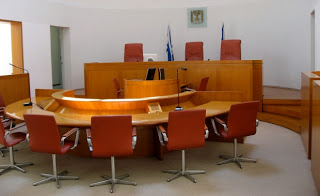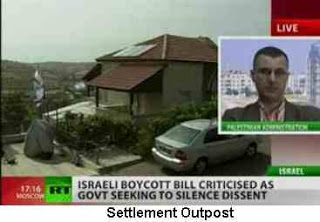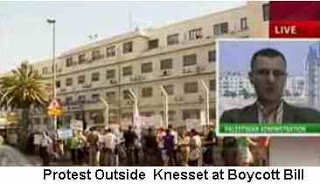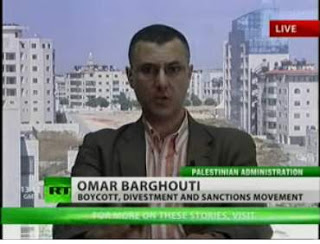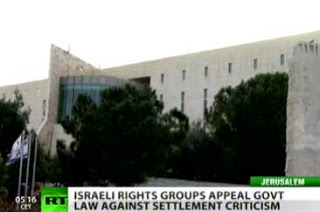even for Israeli Jews
It is difficult, amongst all the reactionary legislation that the Knesset now passes under its far-right settler government, to decide which is the worst. What is certain is that even within Israel, the law that has had the most reaction to it has been the Boycott law. At first this might be surprising but the law effectively outlaws free speech in the whole area of campaigning and criminalises large sections of Israel’s Arab citizens. who have good reason to want Israel to be subject of a Boycott.
However one should hold out no illusions about Israel’s Supreme Court striking down the Act. Like its US counterpart, the Israeli Supreme Court is now stuffed with far right appointees, the latest being a West Bank settler, Noam Sohlberg. Israel’s supreme court has always been an upholder of all things to do with Zionist values.
For example the court has always refused to recognise the concept of an Israeli nationality. Because if there were such a thing then Israel would be a state of its own citizens, rather than a State of the ‘Jewish People’.
In 1970 a legal suit brought by Tel Aviv psychologist, George Tamrin, failed. Shimon Agranat, the ‘liberal’ head of the supreme court ruled that:
“There is no Israeli nation separate from the Jewish people. … The Jewish people is composed not only of those residing in Israel but also of diaspora Jewries.”
Today of course even Israeli Jews are subject to increasingly repressive laws if they step out of line. And with a Boycott Within movement, and Boycott seen as a challenge to Israel’s legitimacy, Israel is dropping any pretence to be a democracy.
Tony Greenstein
More than six months after enactment of the “Boycott Law”, the responseד of the Knesset and government to the Gush Shalom appeal against that law were at last presented to the Supreme Court.
In the response which he submitted to the court, the Knesset’s legal adviser, Adv. Eyal Yinon, clearly distances himself from this law. He recalls that, prior to the final vote in the plenum, he had warned of constitutional difficulties inherent in considering a boycott on products made at settlements in the Occupied Territories (“an Area Under Israeli Control” as the law terms it) as being “a boycott of Israel”, to be punished accordingly. He further notes that similar warnings had been made by the Deputy Attorney General and the Legal Advisor to the Knesset Judicial Committee.
Moreover, also the Foreign Ministry’s legal experts – Advocates Ehud Keinan and Karin Dozortz – expressed reservations about the law and made clear their considered opinion that such a law would not help the struggle against boycott of Israel, and might actually harm it. Also the Ministry of Finance’s legal adviser disapproved of this law, as did the Manufacturers’ Association whose members’ interests were supposed to be defended by its enactment.
The right-wing majority in the Knesset ignored, however, this advice from numerous legal experts, and insisted upon enacting the law. The Knesset’s legal adviser was left duty bound to represent towards the Supreme Court the law they passed – but as he made abundantly clear, not out of his own personal conviction.
For example, the Knesset’s Legal Adviser response to the Supreme Court includes extensive quotations from his own expert opinion submitted to the Knesset on the eve of its passage in the plenum: “This bill aims to change the legal standing of a call for a boycott – in case that such a call is designed to influence the political debate about the future of Judea and Samaria, an issue which is at the center of political controversy in Israel for more than forty years. (…) A call for boycott about one single issue, proceeding from one single political position, would become in law a tort, and those making such a call would become open to judicial proceedings and the payment of punitive damages.
At the same time, a boycott call proceeding from other ideological, social or religious motivations would continue to be a legitimate – even if controversial – act in the context of public debate. Such would be, for example, the case of boycott calls aimed at artists who did not serve in the IDF, at universities which do not play the National Anthem at their graduation ceremonies, at shops and restaurants which sell non-kosher food, or – to take the recent example – of consumer boycotts aimed at producers and retailers who sell their products at prices perceived as being too high. All of these would not constitute grounds for judicial sanctions of any kind, while calls for boycott in the context of the debate on the future of Judea and Samaria would become a legally unacceptable act, making those who commit it liable to be prosecuted and fined.
Under these circumstances, we believe that the bill’s broad definition of ‘a boycott on Israel’ constitutes a fundamental violation of the Freedom of Speech in Israel. It brings these elements of the bill to the brink of unconstitutionality, and possible beyond that brink.” So far, the considered opinion written by the Knesset’s legal adviser on the eve of the vote in the plenum, and quoted by himself in the present defense, remarks also much like those of Adv. Sigal Kogut, the legal adviser to the Knesset Judicial Committee. For his part, Raz Nizri, Deputy Attorney General, had told the Knesset Members that this was “very much of a borderline piece of legislation”, which would if enacted “raise great difficulties”.
“We are appealing to the Supreme Court, asking the judges to determine that the Knesset’s prohibition on a call for a boycott of the settlements is an anti-democratic gagging act, contravening the freedom of expression and of political activity. In this, we need to add very little to the arguments presented by the Knesset’s own legal adviser” says Adam Keller, Spokesperson of Gush Shalom.
It should be noted that the state’s response to the court reveals that, so far, there were no regulations made which would enable the Finance Minister to deny government funding to bodies which call for a boycott of the settlements – though the Boycott Law provided for such regulations to be made within ninety days of enactment, a deadline which is long past. In addition, to date not a (single) claim for tort was lodged by any settlers against those calling for a boycott of settlement products.
Based on this situation, the State Attorney’s representatives asked The Supreme Court to reject the appeal on the grounds that the issue is “not yet ripe”. Keller says that this argument is not serious. “The law created a situation where a sword is perpetually hanging over the heads of Israeli peace-seekers, so as to intimidate and deter them from struggling for the principles they believe in. The ability which this law gives to the settlers and their supporters, to strike a blow at any moment they choose, is having its anti-democratic effect even without their having to use it in practice. We will ask the Supreme Court to remove this hanging sword and see to it that the freedom of expression and freedom of political activity is restored in full”.
In its appeal against “The Boycott Law”, Gush Shalom is represented by lawyers Gaby Lasky and Neri Ramati – who intend to request that the Court shall appoint a broad panel of judges to hear the appeal, in light of the fundamental issues involved. “I hope the court will indeed determine this law to be unconstitutional. In their reactions, neither the Knesset nor the government have given a real response to the contention that this law violates fundamental civil rights in Israel, giving a precedence to the interests of those who benefit from the occupation and denying freedom of expression to opponents of the settlements” says Adv. Lasky. “It is unacceptable that the Knesset’s response draws an analogy between this law and the French law which prohibits a boycott on the basis of race, nationality, religion or gender.”
Besides Gush Shalom, appeals against the Boycott Law were also lodged by Knesset Member Ahmad Tibi and by a citizen group represented by Attorney Adi Barkai.
Contact: Adam Keller +972-(0)54-2340749, Attorney Gaby Lasky +972-(0)54-4418988
